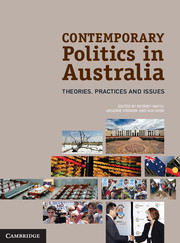Book contents
- Frontmatter
- Contents
- Tables and figures
- Contributors
- Acknowledgements
- Introduction
- I Contemporary Theories of Australian Politics
- Introduction to Part I
- 1 Democratic theories
- 2 Institutionalism
- 3 Behaviouralism
- 4 Critical theories
- 5 Discourse theories and post-structuralism
- 6 International political theories
- Part II Politics in Everyday Australian Life
- Part III Elections
- Part IV Participation and Representation
- Part V Inside the Australian State
- Part VI Contemporary Public Controversies
- Glossary
- References
- Index
4 - Critical theories
from I - Contemporary Theories of Australian Politics
Published online by Cambridge University Press: 05 June 2012
- Frontmatter
- Contents
- Tables and figures
- Contributors
- Acknowledgements
- Introduction
- I Contemporary Theories of Australian Politics
- Introduction to Part I
- 1 Democratic theories
- 2 Institutionalism
- 3 Behaviouralism
- 4 Critical theories
- 5 Discourse theories and post-structuralism
- 6 International political theories
- Part II Politics in Everyday Australian Life
- Part III Elections
- Part IV Participation and Representation
- Part V Inside the Australian State
- Part VI Contemporary Public Controversies
- Glossary
- References
- Index
Summary
Critical theorists fundamentally challenge the premise that Australia is a democratic system. For critical theorists, the approaches of institutionalists and behaviouralists alike divert attention from the deeper structures of power and inequality in countries like Australia. Critical theorists would thus read the material in Chapters 1 to 3 of this book with limited interest. The two schools of critical theory discussed in this chapter – Marxism and feminism – argue that what political scientists need to focus on is the pervasive class and/or gender relations that shape political outcomes. For Marxists, class inequalities in capitalist societies allow those who own and control productive capital to exercise political power over the larger class of workers who do not. For feminists, politics is dominated by masculine assumptions and interests, at the expense of those of women. Marxists and feminists thus both stress the role of deep structures in shaping politics, and see a restricted role for individuals or groups to exercise political agency. This chapter explores the ways in which those with different Marxist and feminist perspectives explain these deep structures.
- Type
- Chapter
- Information
- Contemporary Politics in AustraliaTheories, Practices and Issues, pp. 36 - 45Publisher: Cambridge University PressPrint publication year: 2012

